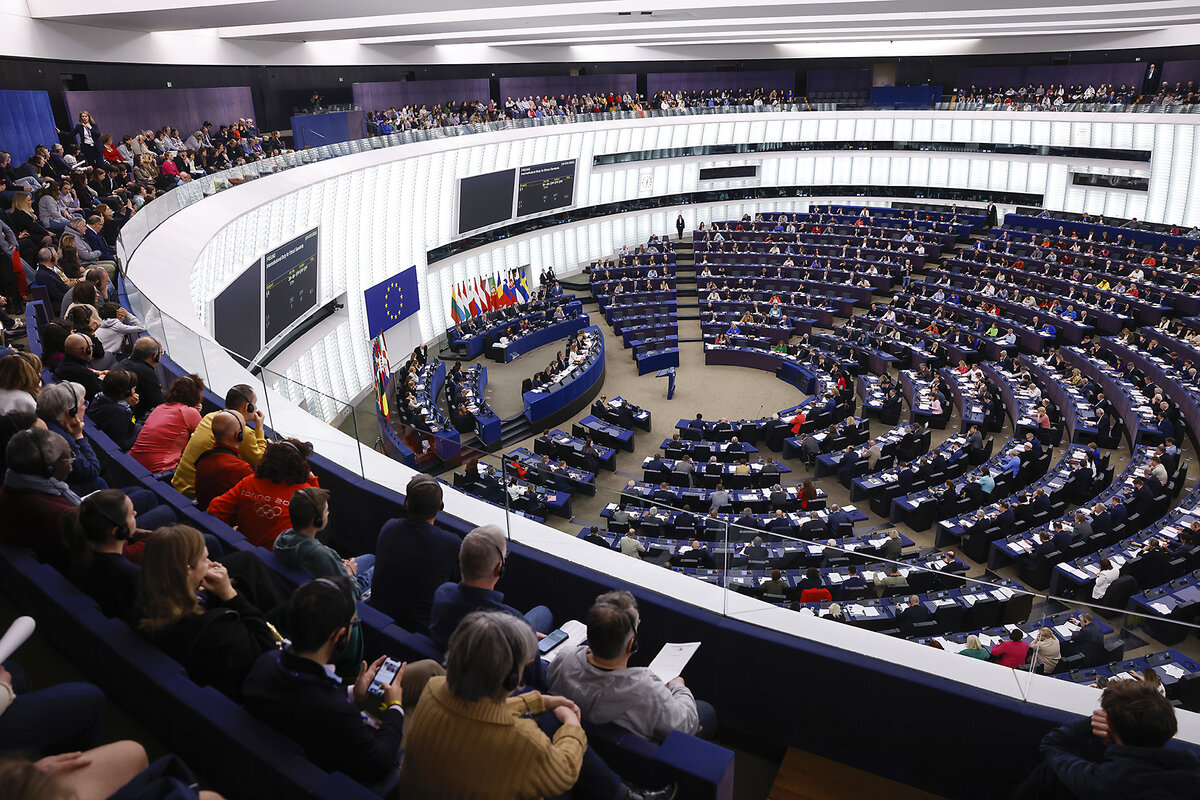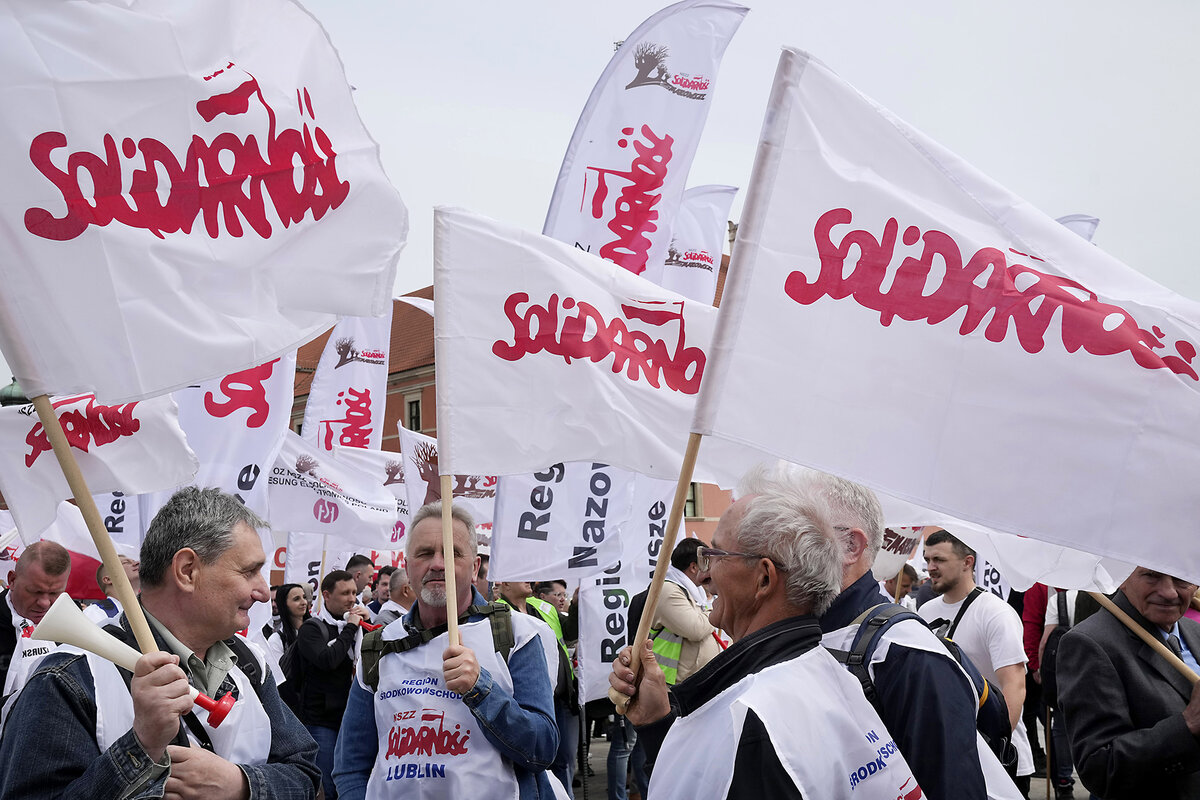In Europe, moderate conservatives seek to steal hard right’s thunder
Loading...
| London
Their surge in the polls is striking. And with just days until a major Europe-wide election, so is the message of alarm on editorial commentary pages: Far-right parties are on the march!
Yet the more critical shift – and the key to whether far-right policies on issues ranging from immigration to climate change will gain a stronger foothold – is happening on Europe’s political center ground.
Mainstream conservative parties across the 27-nation European Union, which are the European equivalent of America’s pre-Donald Trump Republicans, have increasingly been seeking to ward off the decline in their own support by tacking toward the policy agenda of the far right.
Why We Wrote This
A story focused onWhether hard-right policies are enacted in Europe will depend largely on moderate conservatives fishing for votes in tempting far-right waters.
In several EU countries, most recently, this month, in the Netherlands, they’ve gone further. Breaking with a decades-old European consensus against allowing extreme parties a share of national government, they’ve reached agreements to join far-right parties in ruling coalitions.
Now, ahead of next week’s vote for the 720 members of the European Parliament, the question is whether a similar process may play out there, giving far-right parties unprecedented sway over Europe-wide policy choices.
If the polls prove right, the main center-right grouping in the parliament, the European People’s Party (EPP), will retain the largest single number of seats.
But it is projected to lose 20 to 30 seats; so is the center-left Socialists and Democrats, the second-largest group.
The two far-right groupings, on the other hand, are expected to be the big winners, gaining as many as 60 seats between them.
That would present the EPP politician in charge of the EU’s executive, Germany’s Ursula von der Leyen, with a stark choice.
To win the parliamentary majority she needs in order to secure a second five-year term, should she rely on the Socialists and Democrats and more left-leaning groups?
Or, replicating the pattern which mainstream conservatives have set in the EU’s national capitals, should she make common cause with the far-right?
So far, Ms. von der Leyen has followed the mainstream conservative playbook, tilting policy toward the far-right parties’ agenda, with the clear aim of at least limiting their electoral gains.
Partnering with Europe’s most influential far-right leader, Italian Prime Minister Giorgia Meloni, she has championed a tougher policy on immigration. Billions of dollars have been spent on deals with Libya, Egypt, and Lebanon in a bid to keep migrants away from Europe.
The EU has also paused part of its ambitious Green Deal in response to demonstrations by farmers, a protest movement strongly backed by far-right politicians.
She has been brushing aside reporters’ questions about whether she would rule out seeking far-right parliamentary support for a further term of office.
In fact, she’s said she is “working well” with the Italian leader, describing her as “pro-European” and highlighting her support in one critical policy area where a broad EU consensus has so far held: Support for Ukraine.
Ms. Meloni is making no secret about her intention to maximize far-right influence in the next European legislature.
She has said she hopes to bring together the often fractious members of the two main far-right groupings – her own and the bloc to which Europe’s other most prominent far-right figure, Marine Le Pen, belongs. “It’s a tough challenge,” Ms. Meloni said recently, “but I think we can do it.”
The prospect that Ms. von der Leyen might do a post-election deal with the far right has set off alarm bells among other European parties. If she takes that path, a senior Green politician warned explicitly this week, she would lose his group’s support.
The Greens’ main concern is what will happen to the EU’s climate-change commitments. But other parties, and human-rights groups, have a range of other concerns.
For while far-right parties have fed on a range of voter frustrations – including economic grievances and a sense of abandonment by mainstream politicians – they share a hostility to migrants, religious minorities, and the LGBTQ community, and to the EU’s role in ensuring minority rights and the rule of law.
Few have been as overtly assertive on those fronts as the Dutch populist firebrand Geert Wilders, who has advocated leaving the EU altogether, along with banning the Koran and outlawing mosques.
Earlier this month, he reached agreement with the center-right Party for Freedom and Democracy (VVD) and two smaller groups to form a parliamentary coalition.
During the election campaign last year, the traditionally moderate VVD hoped that by pledging to tighten immigration rules, it would steal Mr. Wilders’ thunder. In fact, its endorsement of his core argument that migrants were a problem led large numbers of voters to choose Mr. Wilders’ prescription for dealing with them.
His party finished a surprise first in the election, with about 23% of the vote.
On the surface, Mr. Wilders has had to compromise to secure his coalition agreement. He has agreed not to be prime minister, to drop his campaign to leave the EU, and to soften his broadsides against migrants and Muslims.
Still, the agreement does include far tougher immigration and asylum controls. It also lowers the country’s climate change targets.
In the words of an editorial in the French daily Le Monde, the deal has required the VVD in effect to “integrate” Mr. Wilder’s ideas, in the hope that a combination of his newfound legitimacy and “the reality of power” will moderate him.
“That,” the newspaper argued, “is a dangerous gamble.”








